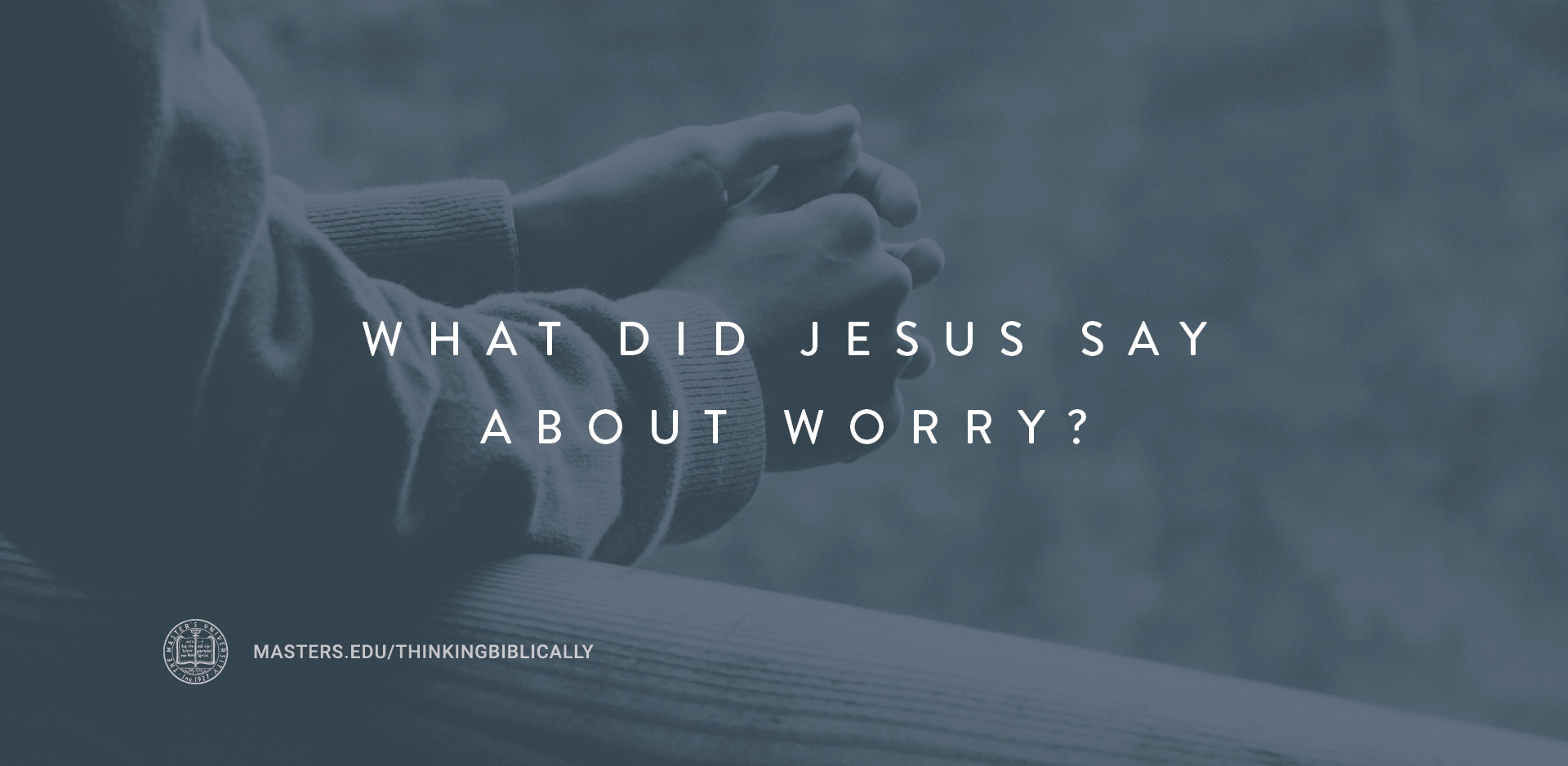
You probably remember the “What Would Jesus Do?” trend from the late ’90s. It seemed everywhere you looked, plastered across T-shirts, hats, jewelry, and all kinds of other merchandise, the WWJD slogan was a blithe, shallow reminder to live up to Christ’s moral code.
But Christianity is not about mere morality. It’s about the atoning work of Christ on our behalf. With that in mind, we can ask much better and more sanctifying questions, like “What did Jesus do?” and “What did He say?” Our ability to avoid and defeat sin comes not from imagining Christ in our circumstances but from obeying His clear commands and following the example of His life in Scripture. Knowing what Jesus said about sin is key to overcoming it.
We’ve been discussing our natural bent toward anxiety, and what God’s Word says about how we must control and conquer our worry. In Matthew 6:25 Jesus commanded His followers, “Do not be worried about your life, as to what you will eat or what you will drink; nor for your body, as to what you will put on. Is not life more than food, and the body more than clothing?”
The tense of the Greek text is properly translated, “Stop worrying.” The tense in Matthew 6:31is different, however, and means, “Don’t start worrying.” Thus Jesus brackets our passage with this meaning: If you are worrying, quit; if you haven’t started, don’t.
The Greek word for “life” is psuchē. It has to do with the fullness of earthly, physical, external life. Don’t be anxious about this temporal world—and the food, clothing, and shelter associated with it. Jesus said previously, “Where your treasure is, there your heart will be also” (Matthew 6:21). Focusing on earthly treasures produces earthly affections. It blinds our spiritual vision and draws us away from serving God. That’s why God promises to provide what we need.
As children of God, we have a single goal—treasure in heaven; a single vision—God’s purposes; and a single Master—God, not money (Matthew 6:19-24). Therefore, we must not let ourselves become preoccupied with the mundane things of this world—“what [we] shall eat, or what [we] shall drink” (Matthew 6:25).
Perhaps in our modern society, such a warning seems a bit obscure. After all, there’s a market of some sort on practically every corner. And we’ve got so much water in our homes, we don’t often think about running out.
It usually takes some kind of disaster—like the massive storm that hit the eastern United States recently—to shake loose the cobwebs of sustained comfort and remind us that our basic necessities are often abundant, but never guaranteed. And even then, such disasters usually amount to only a temporary interruption of our normal routine.
Life in the world of the New Testament was not so simple. There were times when the snows didn’t come to the mountains and, as a result, the streams didn’t run. Sometimes a plague of locusts would devour the crops, bringing about famine in the land. When there was famine, there was also no income. And when there was no income, no one could purchase food, clothing, or other necessities.
Jesus’ saying not to worry about such things is especially powerful in the context of His day. Certainly that is an indictment of our own worry about life’s basics. Jesus then asks rhetorically, “Is not life more than food, and the body than clothing?” (Matthew 6:25). Of course it is, but you wouldn’t know it judging by what’s advertised today and what people seem to feel they need to be pursuing.
So many people in our society are totally consumed with the body—they decorate it, build it up, extravagantly clothe it, put it in a nice car, send it off to a nice house, stuff it full of food, sit it in a comfortable chair, hang a bunch of jewelry all over it, take it out on a boat, let it swim, teach it to ski, take it on a cruise, and so on. But life is not contained in those things; it transcends all the externals. Life comes from God—and the fullness of life from Jesus Christ.
In the days ahead we’re going to look at several compelling and convicting reasons Jesus gives for not worrying.

The Master’s University and Seminary admit students of any race, color, national and ethnic origin to all the rights, privileges, programs, and activities generally accorded or made available to students at the school. It does not discriminate on the basis of race, color, national and ethnic origin in the administration of its educational policies, admissions policies, scholarship and loan programs, and athletic and other school-administered programs.
21726 Placerita Canyon Road
Santa Clarita, CA 91321
1-800-568-6248
© 2025 The Master’s University Privacy Policy Copyright Info
| Cookie | Duration | Description |
|---|---|---|
| cookielawinfo-checkbox-analytics | 11 months | This cookie is set by GDPR Cookie Consent plugin. The cookie is used to store the user consent for the cookies in the category "Analytics". |
| cookielawinfo-checkbox-functional | 11 months | The cookie is set by GDPR cookie consent to record the user consent for the cookies in the category "Functional". |
| cookielawinfo-checkbox-necessary | 11 months | This cookie is set by GDPR Cookie Consent plugin. The cookies is used to store the user consent for the cookies in the category "Necessary". |
| cookielawinfo-checkbox-others | 11 months | This cookie is set by GDPR Cookie Consent plugin. The cookie is used to store the user consent for the cookies in the category "Other. |
| cookielawinfo-checkbox-performance | 11 months | This cookie is set by GDPR Cookie Consent plugin. The cookie is used to store the user consent for the cookies in the category "Performance". |
| viewed_cookie_policy | 11 months | The cookie is set by the GDPR Cookie Consent plugin and is used to store whether or not user has consented to the use of cookies. It does not store any personal data. |
Notifications